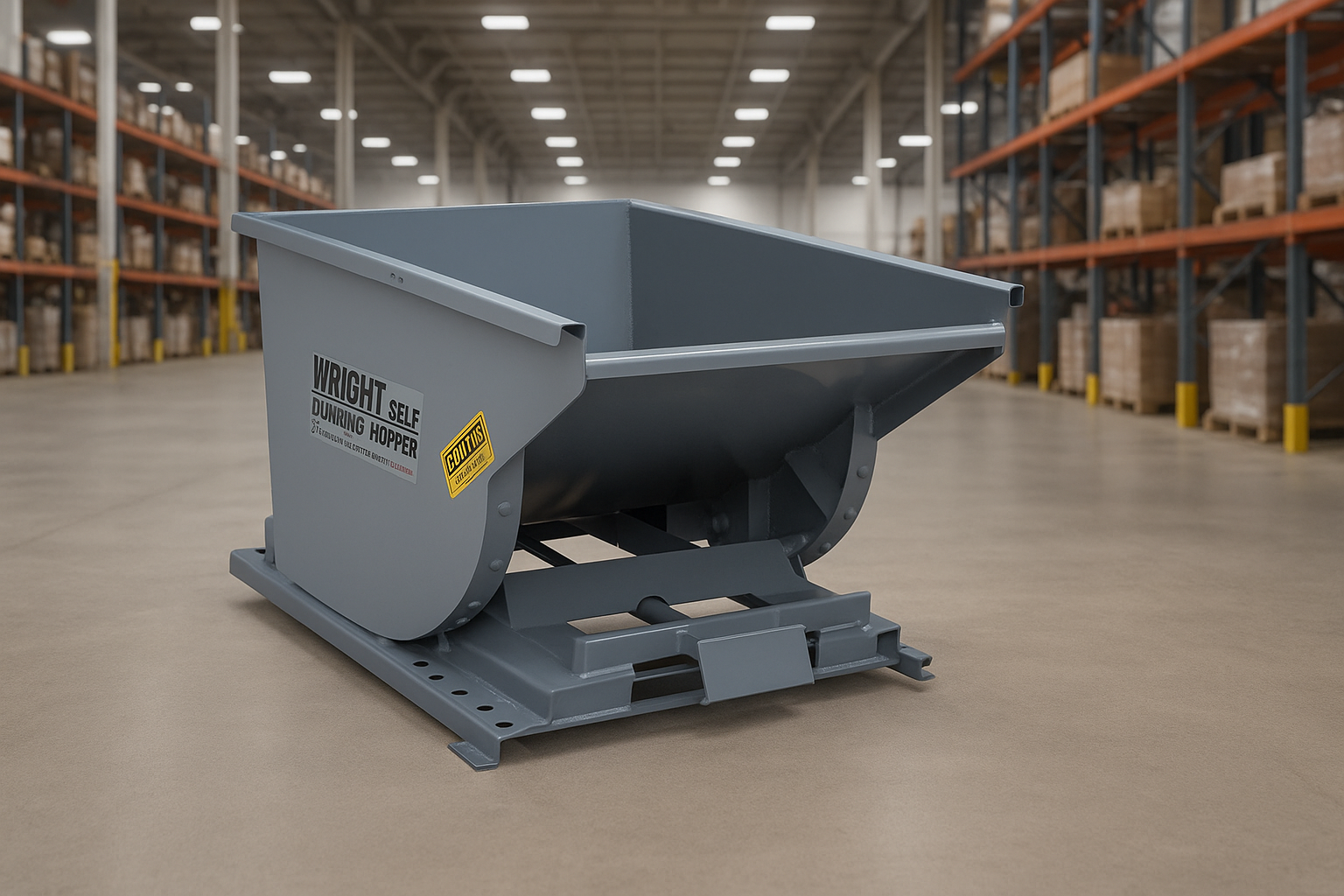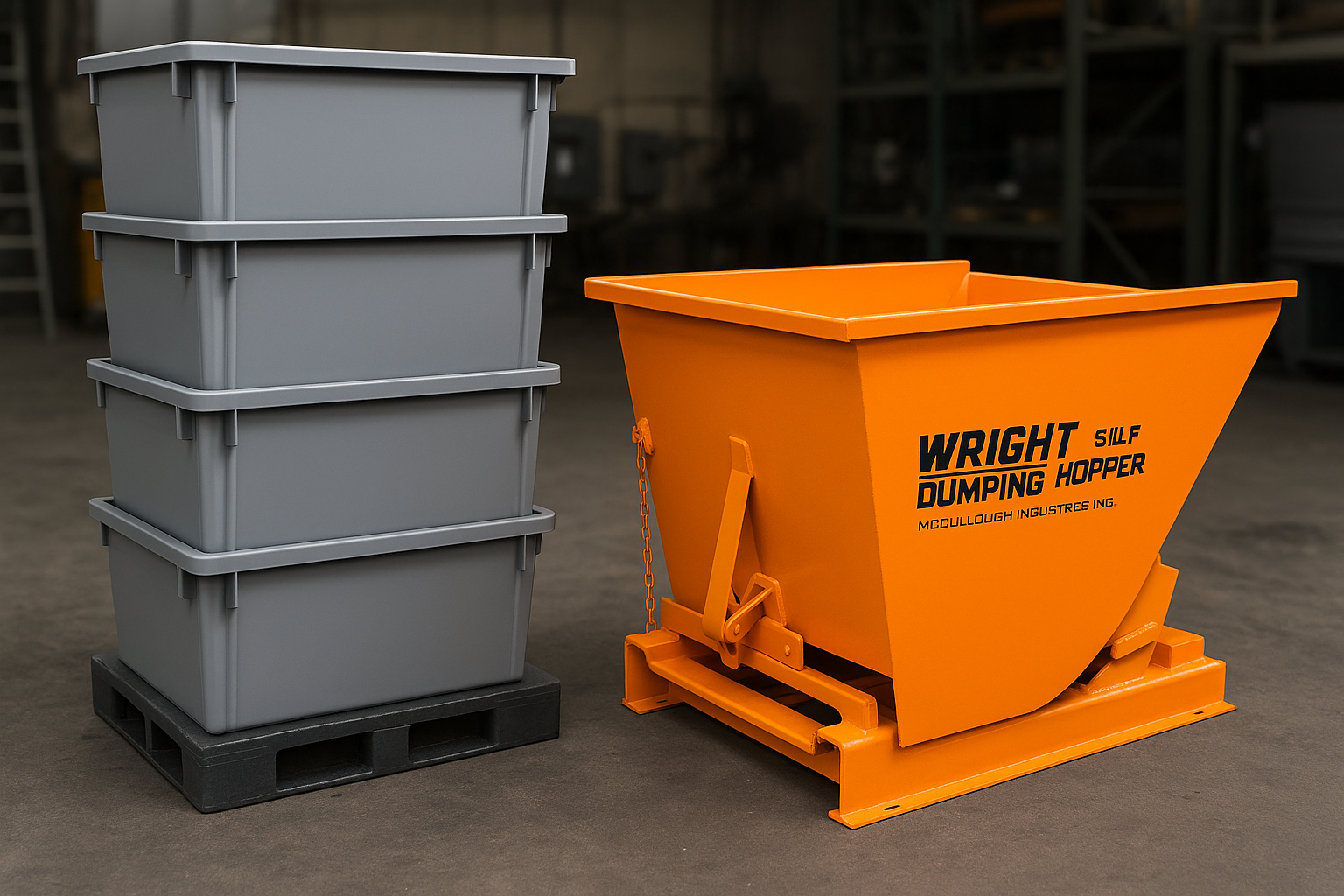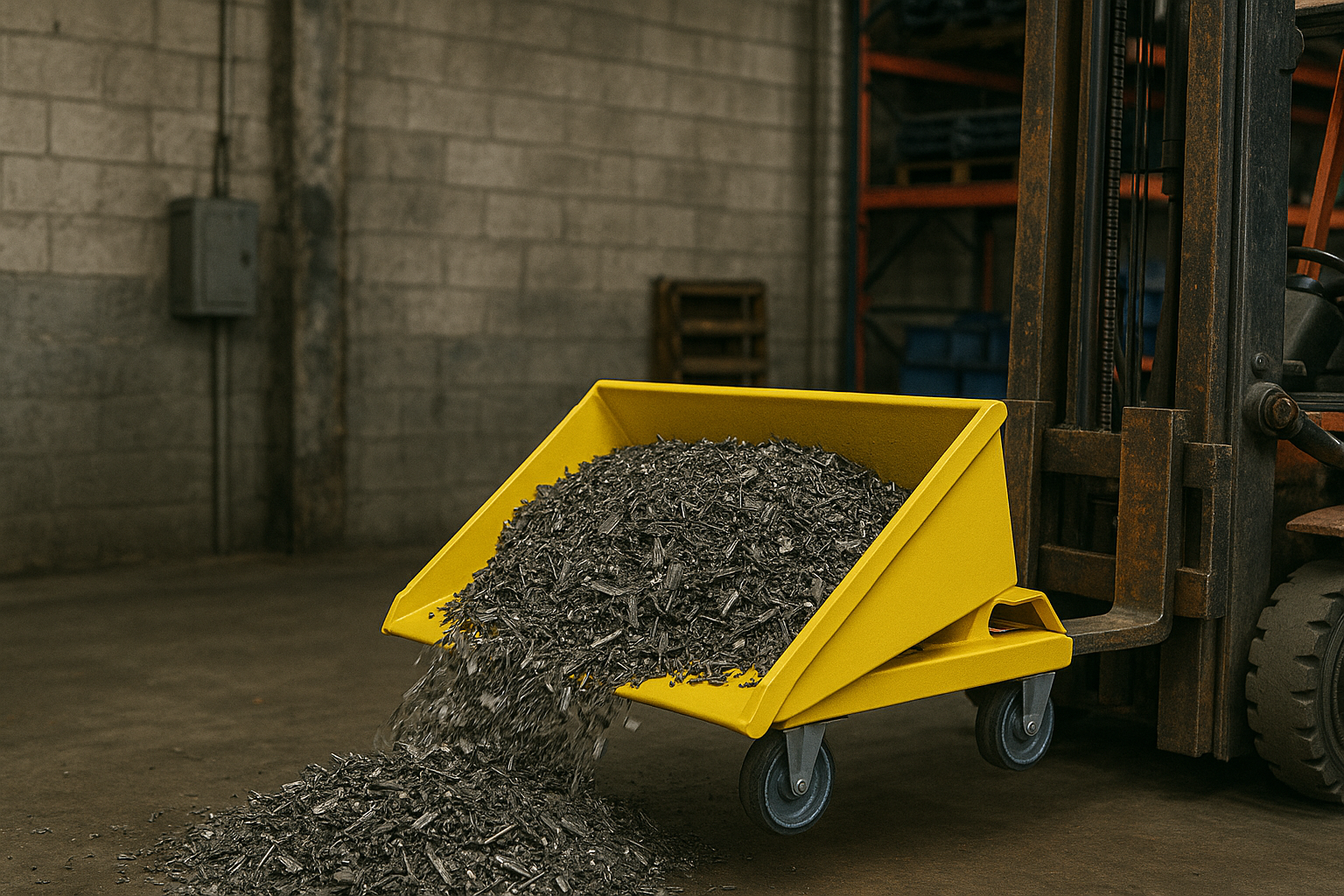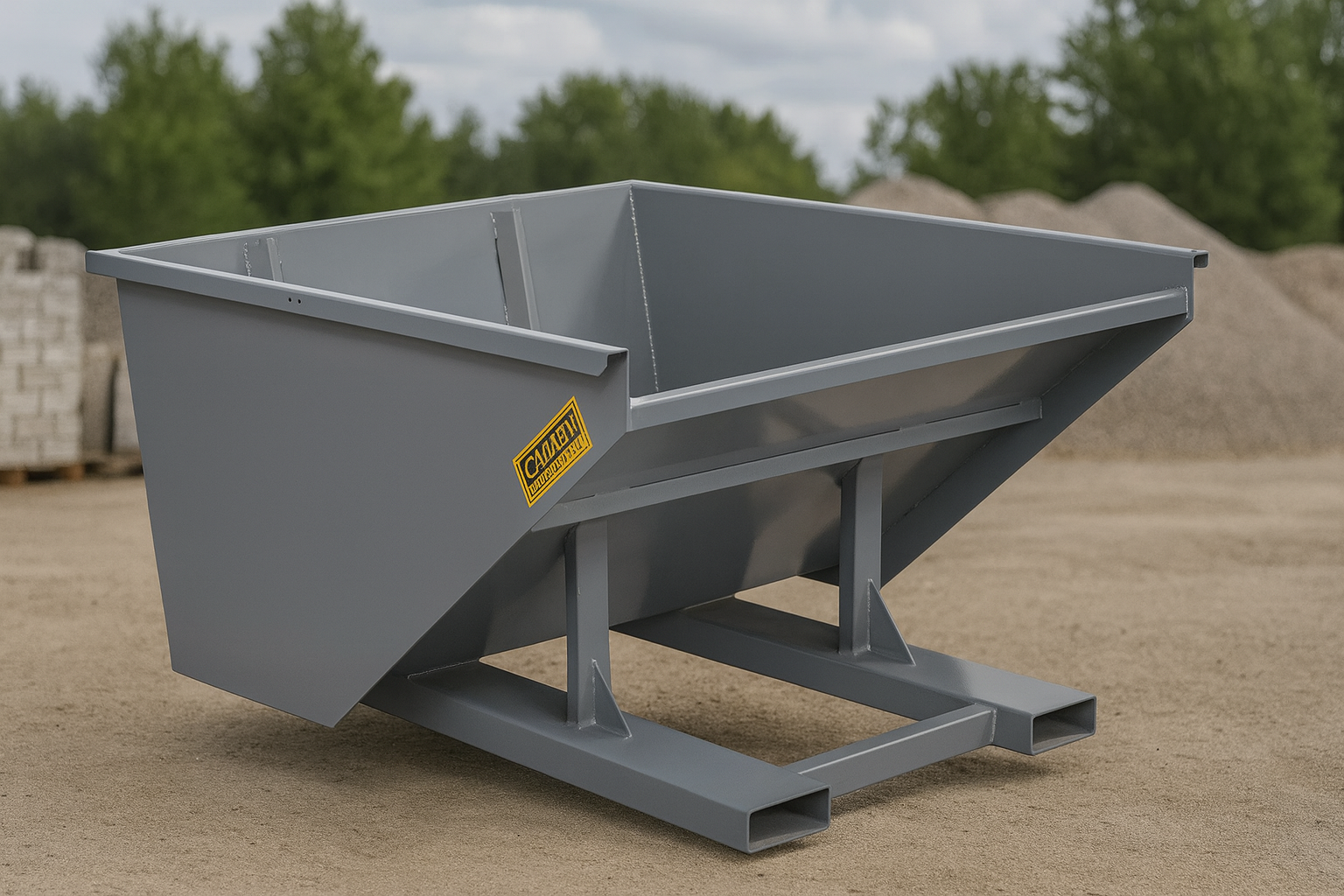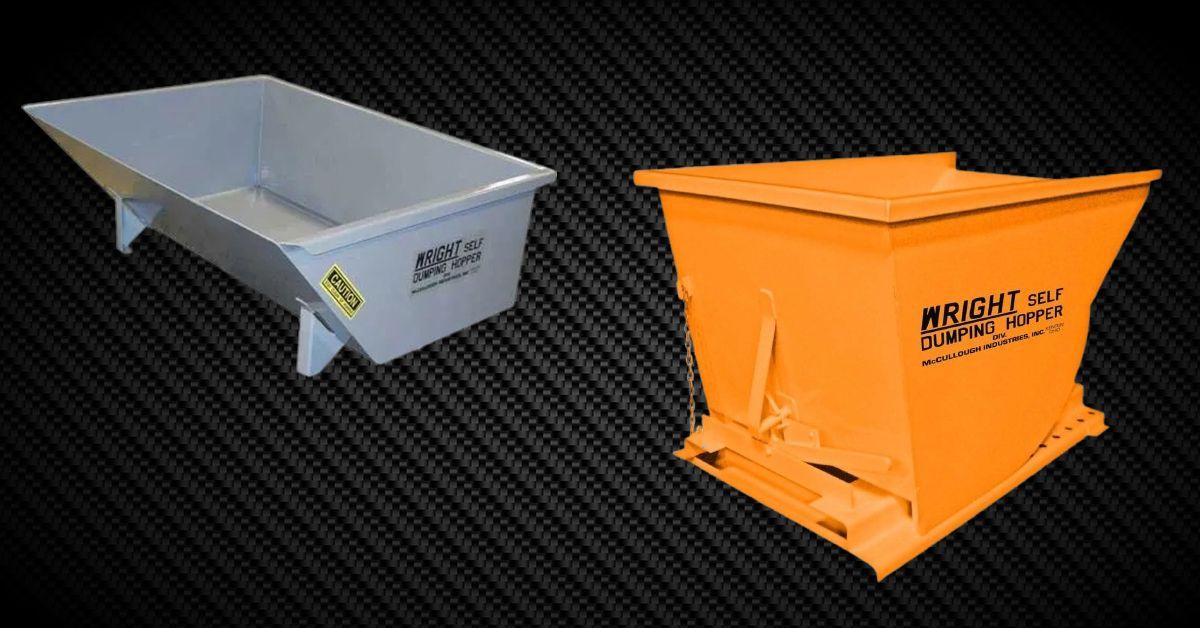
In the world of material handling, terms like "forklift dumpster" and "self-dumping hopper" often get used interchangeably, but they don’t always mean the same thing. For industrial buyers, understanding the difference can impact your workflow, safety, and long-term equipment investment.
At McCullough Industries, we manufacture self-dumping hoppers designed to outlast and outperform many generic "dumpster-style" bins. In this blog, we’ll break down how the two terms compare, when they overlap, and why choosing a purpose-built hopper often delivers better results.
What Is a Forklift Dumpster?
The term "forklift dumpster" is widely used to describe a rugged container that can be picked up and moved using standard forklift forks. These bins are usually used to handle scrap, production waste, or loose materials in commercial and industrial settings. However, the construction and performance of these units can vary significantly.
Most forklift dumpsters are basic metal containers with minimal reinforcement. They may allow tipping or dumping through assisted forklift movement, but they often lack a secure dumping mechanism or safety lock. This can increase the risk of accidental spills or injury during transport. Many of these models are also not designed for long-term heavy-duty use, especially in environments that demand repetitive dumping cycles or high weight capacities.
What Is a Self Dumping Hopper?
In contrast, a self-dumping hopper is engineered specifically for safe, repeated, and efficient dumping operations. At McCullough Industries, our self-dumping hoppers are made from heavy-duty steel, feature secure locking systems, and are equipped with a low center of gravity to ensure stability when moving and dumping.
Unlike a basic dumpster, these hoppers are designed to tip forward using gravity or hydraulic-assisted release systems and automatically return to the upright position after dumping. This makes them ideal for busy operations where time, safety, and consistency are critical. McCullough hoppers are also compatible with forklifts, thanks to 3" x 7.5" fork pockets that ensure a stable, balanced lift even under full load.
Comparing Forklift Dumpsters and Self-Dumping Hoppers
Let’s break down how the two compare on features that matter in industrial use:
| Feature | Forklift Dumpster | Self-Dumping Hopper (McCullough) |
|---|---|---|
| Dumping Mechanism | May require manual tilt or push | Controlled dump with automatic return |
| Structural Integrity | May use thinner-gauge metal | Heavy-duty steel (7-gauge+), reinforced base |
| Fork Compatibility | Basic fit for forklift forks | Engineered fork pockets for balance and safety |
| Safety Design | Limited or no locking features | Includes locking latch and low center of gravity |
| Size & Weight Capacity | Often small and limited load | 1/4 to 6 cubic yards, up to 7,000 lbs |
| Customization Options | Rare | Fully configurable (casters, lids, paint, coatings) |
| Mobility | Often stationary | Can be outfitted with swivel or rigid casters |
| Ideal Use Cases | Light-duty, general-purpose | Scrap, metal shops, recycling, warehouses |
When Forklift Dumpsters and Self Dumping Hoppers Overlap
Many industrial buyers begin their search looking for a "forklift dumpster" because that’s the familiar term. But in practice, most of those buyers are actually looking for a more robust solution one that’s designed to dump automatically, hold up under tough conditions, and improve workflow over time. That’s where a self-dumping hopper fits perfectly.
Forklift dumpsters may suffice for occasional debris collection or low-volume disposal, but when your operation involves daily use, heavy scrap, or strict safety standards, the better long-term solution is a purpose engineered hopper built for those exact demands.
How McCullough Self-Dumping Hoppers Deliver More
McCullough Industries has been engineering durable dumping systems for decades. Our hoppers are designed with industrial operations in mind, offering longer lifespan, safer use, and greater flexibility than a basic bin ever could.
Each hopper is fabricated with reinforced steel sides, a heavy-duty base, and welded fork pockets to ensure stable forklift handling. Optional features like bump-release mechanisms allow for hands-free dumping when contacting a roll-off container. We also offer braking casters, customizable lid designs, and paint or powder-coat finishes to match your facility’s needs.
Our GEN II line of self-dumping hoppers provides multiple sizes ranging from 1/4 cubic yard to 6 cubic yards. With weight capacities between 4,000 and 7,000 pounds, these hoppers are ready for everything from lightweight debris to dense scrap metal. Their automatic return to upright position after dumping also streamlines repetitive workflows, reducing manual labor and improving safety.
Built for Forklift Handling
One of the primary advantages of McCullough’s hoppers is how precisely they are designed for forklift use. Rather than loosely accommodating forks, our hopper base features a reinforced cradle with specific fork pocket dimensions to prevent shifting, tipping, or slippage.
Because stability is built into the design, operators can move, raise, and dump hoppers with confidence. For operations with high-volume material transfer or multi-zone dumping, this built-in compatibility helps reduce downtime and maintain consistency shift after shift.
Use Case Examples
- A recycling facility handling mixed metal scrap upgraded from modified bins to McCullough hoppers with bump release. They saw reduced loading time and fewer safety incidents.
- A warehouse facility used hoppers with caster sets and lids to streamline cardboard collection and floor cleanup. The operators no longer had to manually empty containers.
- A machining plant needed rugged bins for oily steel chips. McCullough’s 7-gauge hoppers with leak-proof welds replaced deteriorating forklift dumpsters.
Why It Matters to Get the Right Solution
At a glance, a bin that dumps might look like any other. But beneath the surface, there’s a world of difference in how they’re built and what they can withstand. Choosing a true self-dumping hopper means selecting a solution that improves long-term safety, efficiency, and ROI.
McCullough’s line of engineered hoppers is purpose-built for industrial use not just a container that fits forks. Whether you’re handling daily scrap, organizing floor waste, or moving high-weight loads between zones, a self-dumping hopper provides the reliability and performance your team needs.
Conclusion: Know What You’re Getting
If you’re searching for a "forklift dumpster," consider that what you really need might be something more robust. A McCullough self-dumping hopper offers engineered performance, smart safety features, and years of dependable service.
Let us help you choose the right configuration. From heavy-duty steel construction to dumping mechanisms and caster options, McCullough builds every hopper with your environment in mind. Contact us today to spec out a unit that fits your forklift and your workflow.

